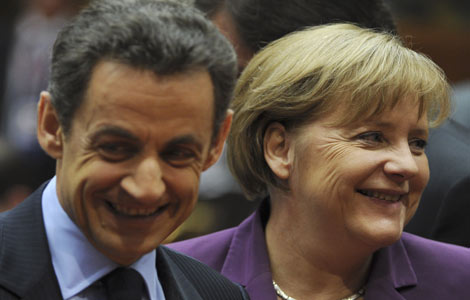Eurozone passes treaty on fiscal rules
Updated: 2011-12-10 08:06
By Fu Jing (China Daily)
|
|||||||||
|
 French President Nicolas Sarkozy speaks with German Chancellor Angela Merkel during a round table session at an EU summit in Brussels on Friday. Geert Vanden Wijngaert / Associated Press |
BRUSSELS - Eurozone countries on Thursday agreed to an intergovernmental treaty that will impose stricter fiscal rules to combat the ongoing European debt crisis, which has gone from bad to worse in the last 18 months.
Despite strong objections from Britain, 23 countries, including all 17 eurozone members, agreed to enact tougher fiscal measures proposed by Germany and France. The agreement will not cover all 27 European Union member countries.
Croatia is expected to officially become the bloc's 28th member on July 1, 2013, after it signed the EU accession treaty on Friday. All the national parliaments within the EU's 27 countries need to ratify the accession.
According to the BBC, the 17 members of the eurozone will work on a separate deal outside EU treaties, and they will be joined by at least six other countries.
The United Kingdom and Hungary will play no part in a new intergovernmental agreement, while Sweden and the Czech Republic will consult their parliaments before making a decision, the BBC reported.
French President Nicolas Sarkozy said the efforts to get unanimous agreement failed because of UK resistance.
The Guardian newspaper said on Friday that the UK is "facing isolation in Europe" after British Prime Minister David Cameron vetoed a revision of the Lisbon Treaty on Thursday. The Financial Times said EU leaders are "struggling to cope" with what it describes as "a profound split".
The New York Times describes the agreement as "not a perfect solution" because it could be seen as institutionalizing a two-speed Europe, but it said the pact had the possibility of being ratified much more quickly than a full treaty amendment.
The BBC reported that German Chancellor Angela Merkel praised the plan of action, saying it would contribute to securing the euro.
The major points of the "fiscal compact" are that the member countries should receive automatic penalties if they violate budget targets.
In the agreement, a cap of 0.5 percent of GDP on countries' annual structural deficits and "automatic consequences" for countries whose public deficit exceeds 3 percent of GDP have been included. The tighter rules are expected to be enshrined in countries' constitutions.
The 23 countries have agreed to provide up to 200 billion euros ($267.7 billion) to IMF to help debt-stricken eurozone members.
Despite the achievements, Hendrik Vos, professor of European Politics at the University of Gent in Belgium, said the situation is worsening, as the bigger and more stable countries, such as Germany and the Netherlands, are now also in the markets' line of fire and could also be jeopardized.
"Finding an agreement that will suit everyone is not always very simple," said Vos, adding that the summit had been used by Merkel to promote a German agenda.
Vos said the new agreement will not solve the current crisis, but this will give a strong signal to the rest of the world and might prompt the European Central Bank into action.
"Many people are very negative about the future of Europe and the Euro, but I'm not," said Adriaan Schout, head of the Clingendael European Studies Program at the Clingendael, a Netherlands-based think tank.
"Many have been achieved in 2011 during the previous eight summits," Schout said. "People wrongly believe that not much else happened at those summits but that's not true."
Eveline Filon contributed to this story.
China Daily











